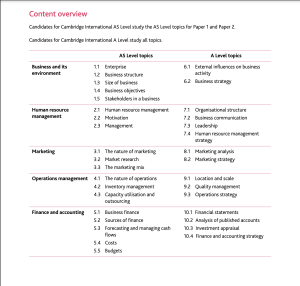A levels business covers a wide range of topics from types of business that exist, their goals, objectives, strategies and so much more and therefore before heading into the coursework itself its important to have a clear overview on the topics and concepts that we’ll be covering as we move further into the course. The below mentioned curriculum is divided into two years based on the vastness and the complexity of the concepts and theories. The topics are interrelated and the theories we learn in the AS level are applied to the concepts learn in the A2 level.
A-levels Business Curriculum Overview
1. Business Environment
- Understanding different types of businesses (public, private, nonprofit)
- Stakeholders and their impact on business decisions
- External influences on business, such as economic, social, technological, legal, and environmental factors
2. Business Structure and Organization
- Organizational structure and types of businesses
- The roles and responsibilities within a company
- Business objectives, mission statements, and how they shape strategic decisions
3. Marketing
- Market research and its importance for identifying customer needs
- Marketing mix (Product, Price, Place, Promotion)
- Brand development and strategies to reach target audiences
- Digital marketing and the impact of technology on consumer behavior

4. Finance and Accounting
- Basic principles of financial accounting (profit, revenue, expenses)
- Financial statements: income statements, balance sheets, and cash flow statements
- Budgeting, forecasting, and financial decision-making
- Sources of finance for businesses and financial planning
5. Operations Management
- Production processes and methods, including lean production and quality management
- Supply chain management, logistics, and inventory control
- The role of technology and innovation in improving efficiency
6. Human Resource Management (HRM)
- Recruitment, training, and development of staff
- Employee motivation and management theories
- Organizational culture, leadership styles, and managing teams
- Labor laws, employment rights, and issues in employee relations
7. Strategic Management
- Business strategy development, SWOT analysis, and competitive analysis
- Corporate social responsibility and ethical considerations in business
- Strategic change and managing organizational transformation
8. Global Business
- International trade, globalization, and its impact on business
- Exchange rates, tariffs, and trade agreements
- Strategies for businesses operating internationally and cultural considerations in global markets
Each topic is designed to build analytical skills and a deep understanding of how businesses operate in various environments, preparing students for higher education in business or related fields, as well as careers in management, finance, marketing, and entrepreneurship. This might seem overwhelming but trust me, when we go over the topics individually, they’ll become much more easier and interesting.